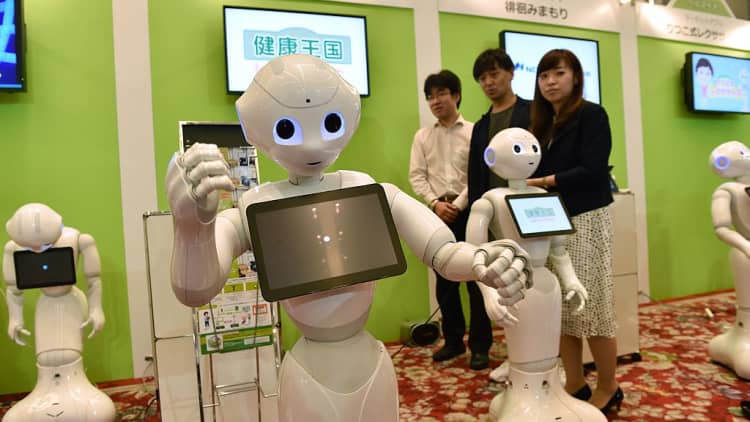
Rarely a week passes without a headline about a new type of robot coming out of Japan.
Whether they're making an evening cocktail, performing at a restaurant or combining cellphone communication with personal companionship — the hype is real in Japan.
CNBC headed to Tokyo to get to know some of these technological advancements promising to reshape the way we live.
What about the threat of automation taking away jobs?
In Japan automation is less of a threat to jobs and more about economic survival. In 2014, Prime Minister Shinzo Abe unveiled reforms with hopes that the robot market would reach $21 billion by 2020.
As the nation suffers from a chronic labor shortage, it is striving to be the largest robotics-support society in the world.
Meanwhile, Japan's service sector accounts for about 70 percent of its economic output, yet labor productivity is 40 percent less than in the U.S., according to Japanese government estimates. The contrast puts a strain on the industry sector and now companies like McDonald's are cutting back on the number of 24-hour outlets.
Robots are seen as a 'must-have'
Economists argue that Japan either needs to accept more immigrants or put robots to work.
Japan's overall population is now declining at the fastest rate globally. The country sells more adult diapers than baby diapers and fewer workers to support an aging population likely leads to poor economic growth.
You're fired
If you think robots are poised to completely take over the service sector, think again. Many of the robots CNBC visited at banks, restaurants, and stores in Tokyo were not fully embraced by consumers for their usefulness. Rather, they were seen as a novelty to play and interact with momentarily while waiting — but maybe entertainment is part of their purpose?
Two robots visited by CNBC had grabbed global headlines last year, but were now no longer in service: a humanoid robot at a department store and a train station robot meant to assist travelers. It wasn't clear from the human staff if the robots were removed because they were ineffective or if their original purpose was just testing.
Either way, robots aren't taking over the world — just yet.


